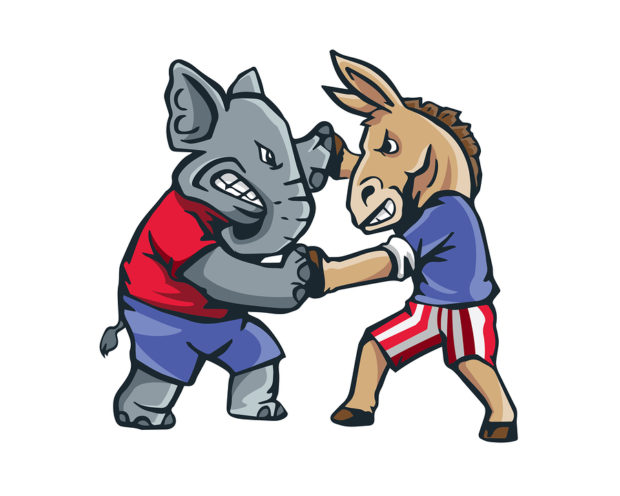Last week, Ranstad US, a human resources services firm, released a survey of U.S. workers revealing that more than half have seen and heard “heated political discussions” taking place at work, causing stress in 72 percent that witnessed such arguments.
In addition, 44 percent say such arguments impact their productivity, Ranstad reported.
The survey data shows that while almost half (49 percent) of respondents said enjoy talking politics with colleagues because it helps them understand other viewpoints, 53 percent also admit they limit social interactions with co-workers who have differing political beliefs.
Do workers care where company leaders stand on immigration? Gun control? LGBT rights? Or what political parties they support?
In performing the survey, Ranstad set out to find out how an employer’s approach to political issues can influence employee engagement and retention. For some workers, it is definitely a factor.
In fact, political viewpoints can drive some employees to quit their jobs, with some 35 percent saying they would leave jobs where direct managers held very different political views than their own and were publicly vocal about them. A much higher percentage—58 percent—would not interview at companies that publicly promoted political beliefs they did not support.
For millennials, the effects are greater. Two-thirds of millennials surveyed said they would quit over political differences with their bosses; for 50-64 year-olds, the percentage of potential quitters was only 15 percent.
Audra Jenkins, chief diversity and inclusion officer, Randstad North America, noted that the “country’s current polarized political climate” can cause deteriorating relationships among workers and lead some workers to feel alienated. “Managers must pay close attention to workplace dynamics within their teams and be sure they’re promoting cultures that are inclusive and tolerant of a range of different political perspectives. Without a strategy in place, organizations run the risk of impacting their diversity and inclusion initiatives by creating another barrier that limits the diversity of thought,” she said in a statement announcing the survey results.
Still, about 65 percent of employees surveyed did say they’re comfortable discussing politics with colleagues, and over one-third (38 percent) said they have even changed their opinions on political issues because of discussions they’ve had with work colleagues.
For the most part, however, survey respondents were divided down the middle, even on survey questions about whether their employers should take stands on political issues, with roughly 50 percent on one side and 50 percent on the other with regard to particular items Ranstad asked about:
- On LGBTQIA rights, 53 percent said yes, they want their employers to take public stands.
- On immigration policy, 54 percent said yes.
- On gun control policy, 53 percent said yes.
Overall, 46 percent of employees say it’s important for them to work for employers that take stands on controversial political issues, and over half (56 percent) say it’s important that the charitable and corporate social responsibility causes their companies support reflect their own political values.
I’m Unfriending You
Politics matter more to millennials than other generations, according to Ranstad’s survey, which not only found that 67 percent would quit over political differences with their bosses, but also found that a similar percentage—69 percent—have changed their feeling towards co-workers after learning what political beliefs the colleagues hold. For all workers, the percentage who change their views of co-workers based on their politics is only 50 percent.
Overall, almost half of all respondents (46 percent) have unfollowed colleagues on social media because of political posts. A similar percentage of workers of all age groups (47 percent) feel the need to hide their political beliefs in order to fit in with senior leaders.
The bottom line: Employers should foster an open dialogue and put guidelines governing political expression in place, Ranstad said, offering tips for finding the right approach to political expression at work.
Survey Methodology
Research findings are based on an OmniPulse survey fielded by national polling firm Research Now on behalf of Randstad US. The survey was fielded from August 13–17, 2018. It included 807 respondents over the age of 18 and a nationally representative sample balanced on age, gender and region.
About Randstad
Randstad North America, Inc. is a wholly owned subsidiary of Randstad N.V., a €23.3 billion global provider of flexible work and human resources services. The firm combines expertise and passion of its employees, with innovative HR technologies to advance the careers and business success of candidates and clients.
Randstad’s North American operations comprise 5,700-plus associates and a deployed workforce of more than 100,000 in the U.S. and Canada. In addition to staffing and recruitment, Randstad offers outsourcing, consulting and workforce management solutions for generalist and specialist disciplines, including technology, engineering, finance and accounting, clinical and non-clinical healthcare, human resources, legal, life sciences, manufacturing and logistics, office and administration, and sales and marketing.
Source: Randstad US





















 AI Got Beat by Traditional Models in Forecasting NYC’s Blizzard
AI Got Beat by Traditional Models in Forecasting NYC’s Blizzard  Telematics and Trust: How Usage-Based Insurance Is Transforming Auto Coverage
Telematics and Trust: How Usage-Based Insurance Is Transforming Auto Coverage  High Court Ruling on Trump Tariffs to ‘Ease Uncertainty,’ Says AM Best
High Court Ruling on Trump Tariffs to ‘Ease Uncertainty,’ Says AM Best  Focus on Ski Guides After Deadly California Avalanche Could Lead to Criminal Charges, Civil Suits
Focus on Ski Guides After Deadly California Avalanche Could Lead to Criminal Charges, Civil Suits 




